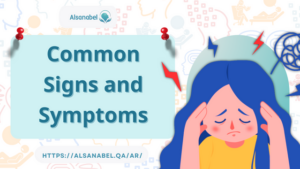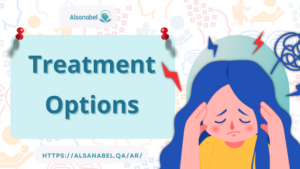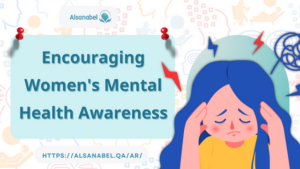Recognizing and Addressing Women's Depression 2024
- Category Mental health Qatar
Depression is a mental health condition that affects many women worldwide. Women’s depression can be characterized by persistent feelings of sadness, loss of interest or pleasure in activities, changes in appetite and sleep patterns, and difficulty concentrating. It is important to understand that women may experience depression differently due to biological factors such as hormonal changes and societal pressures. Recognizing the unique aspects of women’s depression is crucial in order to provide appropriate support and treatment.
Recognizing and addressing women’s depression by Psychiatrist in Qatar is of utmost importance in order to ensure their overall well-being and quality of life. Women often face unique challenges and societal pressures that can contribute to the development and worsening of depression.
Table of Contents
ToggleCommon Signs and Symptoms
Women experiencing depression may exhibit a range of physical, emotional, and behavioral symptoms:

- Physical symptoms may include fatigue, changes in appetite or weight, sleep disturbances, and headaches.
- Emotional symptoms can include persistent sadness, feelings of hopelessness, irritability, and loss of interest in previously enjoyed activities.
- Behavioral symptoms might manifest as social withdrawal, difficulty concentrating, increased sensitivity to rejection, and thoughts of self-harm or suicide.
Recognizing these signs is crucial in identifying and addressing women’s depression effectively.
Physical Symptoms
Physical symptoms of women’s depression can manifest in various ways. These may include increased fatigue, changes in appetite or weight (such as significant weight loss or gain), sleep disturbances (either insomnia or excessive sleeping), and frequent headaches. It is essential to recognize these physical symptoms as they can often be indicative of underlying depression and should not be ignored. Seeking professional help from a psychiatrist or psychologist in Qatar is crucial for proper diagnosis and treatment.
Emotional and Behavioral Symptoms
Women’s depression can also manifest through emotional and behavioral symptoms. These may include persistent feelings of sadness, hopelessness, or emptiness, loss of interest in activities once enjoyed, difficulty concentrating or making decisions, irritability or anger outbursts, withdrawal from social interactions, and thoughts of self-harm or suicide.
It is crucial to be aware of these symptoms and seek professional help from a psychologist or psychiatrist in Qatar for proper diagnosis and treatment. Mental health Qatar resources are available to provide support and guidance.
Causes and Risk Factors
The causes of women’s depression can be multifactorial. Biological factors such as hormonal changes, genetic predisposition, and imbalances in brain chemistry can contribute to the development of depression. Psychological factors like past trauma or abuse, low self-esteem, and negative thinking patterns can also play a role. Additionally, certain social and environmental factors, such as stress, major life events, and lack of social support, may increase the risk of woman’s depression. Identifying these causes and risk factors is crucial for effective diagnosis and treatment.
Biological Factors
- Hormonal changes: Fluctuations in hormone levels, particularly during puberty, pregnancy, and menopause, can contribute to women’s depression.
- Genetic predisposition: Research suggests that there may be a genetic component to depression, with certain individuals being more susceptible due to their genes.
- Imbalances in brain chemistry: Neurotransmitters like serotonin, dopamine, and norepinephrine play a role in regulating mood. When these neurotransmitters are imbalanced, it can lead to depressive symptoms.
- Other biological factors: Certain medical conditions, such as thyroid disorders or chronic pain, can also increase the risk of developing depression in women.
Psychological Factors
Psychological factors can contribute to women’s depression. Some common psychological factors include low self-esteem, negative thinking patterns, perfectionism, and past trauma or abuse. Additionally, certain personality traits, such as being highly sensitive or having a tendency to worry excessively, can also increase the risk of developing depression. Addressing these psychological factors through therapy and counseling with Psychiatrist in Qatar can be crucial in treating women’s depression.
Effects on Women’s Mental Health
Women’s depression can have significant effects on their mental health. It can lead to increased feelings of sadness, hopelessness, and guilt. Women with depression may experience difficulty concentrating, making decisions, and performing daily tasks. Sleep disturbances and appetite changes are also common. Additionally, depression can worsen existing mental health conditions and increase the risk of self-harm or suicide. It is essential to address women’s depression promptly to protect their mental well-being and overall quality of life.
Impact of Depression on Women’s Mental Health
Depression can have a significant impact on women’s mental health. It often leads to feelings of sadness, hopelessness, and guilt. Women with depression may struggle to concentrate, make decisions, and carry out daily tasks.
Sleep disturbances and changes in appetite are common. Depression can also exacerbate existing mental health conditions and increase the risk of self-harm or suicide. Addressing and treating depression promptly is crucial for protecting women’s overall well-being and quality of life.
Specific Challenges Faced by Women with Depression
- Women with depression often face unique challenges that can exacerbate their symptoms and impact their overall well-being.
- Hormonal changes, such as those experienced during pregnancy, postpartum period, or menopause, can contribute to the development or worsening of depression in women.
- Societal expectations and role expectations may add additional pressure on women, further increasing their risk for depression.
- Women are more likely than men to experience certain types of trauma, such as sexual assault or domestic violence, which can contribute to the development of depression.
- Some women may also face challenges accessing mental health services due to financial constraints, stigma surrounding mental health Qatar, or lack of awareness about available resources.
Seeking Help and Support
Seeking help and support is crucial for women who are dealing with depression. Recognizing the signs and symptoms of depression is the first step towards seeking professional assistance. Women should reach out to a psychologist or psychiatrist in Qatar for evaluation and diagnosis. Effective support systems, such as therapy groups, online forums, or counseling services, can also provide emotional support and guidance during the healing process.
Recognizing when to Seek Help
Recognizing when to seek help for women’s depression is crucial for early intervention and treatment. If you or someone you know is experiencing persistent feelings of sadness, loss of interest in activities, changes in appetite or sleep patterns, difficulty concentrating, or thoughts of self-harm, it is important to reach out to a psychologist or psychiatrist in Qatar. Taking action and seeking professional Psychologist in Qatar assistance can make a significant difference in managing depression effectively.
Effective Support Systems
Effective support systems are crucial for women with depression in Qatar. These systems can include the involvement of family, friends, and healthcare professionals. Providing a safe and nonjudgmental environment where women feel comfortable expressing their emotions is key. Psychologists and psychiatrists in Qatar play a vital role in providing therapeutic support and guiding individuals through their journey towards recovery from depression.
Treatment Options
Treatment options for women’s depression in Qatar include therapy approaches and medication. Psychologists and psychiatrists in Qatar provide evidence-based therapies like cognitive-behavioral therapy (CBT) and interpersonal therapy (IPT) to help individuals manage their symptoms.

Medication, such as antidepressants, may be prescribed by a Psychiatrist in Qatar, depending on the severity of the depression. Alternative treatments like yoga and mindfulness techniques can also be beneficial in conjunction with traditional therapies. Seeking guidance from healthcare professionals is crucial for determining the most appropriate treatment approach for each individual.
Therapy Approaches for Women’s Depression
Therapy approaches for women’s depression in Qatar focus on evidence-based treatments to help individuals manage their symptoms. Psychologists and psychiatrists utilize techniques like Cognitive-Behavioral Therapy (CBT) and Interpersonal Therapy (IPT) to address negative thought patterns, improve coping skills, and enhance social relationships.
These therapy approaches aim to empower women to develop healthier ways of thinking, feeling, and behaving, leading to improved mental health outcomes. Seeking guidance from healthcare professionals in Qatar is essential for determining the most effective therapy approach for each individual.
Medication and Alternative Treatments
Medication and alternative treatments can be effective in managing women’s depression. Medication options include antidepressants that help regulate mood and reduce symptoms. It is important to consult with a psychiatrist in Qatar to determine the most suitable medication based on individual needs. Additionally, alternative treatments such as acupuncture, yoga, and herbal supplements may also complement therapy and provide additional support for women with depression.
Self-Care Strategies
Self-care is crucial for Women’s Depression. It involves taking steps to prioritize one’s physical, emotional, and mental well-being. Engaging in activities such as regular exercise, healthy eating, and getting enough sleep can have a positive impact on overall mood.
Additionally, practicing stress-reducing techniques like meditation or deep breathing exercises can help manage symptoms of depression. Seeking support from friends, family, or joining support groups can also provide a much-needed sense of community and understanding.
Practical Self-Care Tips for Women
Practical self-care tips for women with depression can contribute to their overall well-being. Some recommendations include setting aside time for themselves, engaging in activities they enjoy, practicing stress management techniques such as deep breathing or meditation, maintaining a healthy lifestyle through regular exercise and balanced nutrition, seeking social support, and prioritizing sleep. These simple steps can help Women’s Depression by restore balance and improve their mental health.
Breaking the Stigma
Breaking the stigma surrounding women’s mental health is crucial in order to create a more supportive and understanding society. By challenging societal stigmas and promoting open discussions about women’s depression, we can help eliminate the shame and judgment that often accompanies mental health issues. Encouraging supportive environments where women feel safe seeking help and support by Psychologist in Qatar is essential for their wellbeing. Let’s work together to break the stigma and ensure that women with depression receive the care they need.
Challenging Societal Stigmas
Challenging societal stigmas surrounding women’s mental health is crucial in order to create a more supportive and understanding society. By breaking down stereotypes and misconceptions, we can help eliminate the shame and judgment that often accompanies women’s mental health issues. Educating communities about the realities of women’s depression and advocating for compassionate treatment will help foster an environment of acceptance and support. It is important to challenge these stigmas so that women feel comfortable seeking the help they need without fear of judgment or discrimination.
Promoting Open Discussions and Supportive Environments
Promoting open discussions and creating supportive environments is crucial in reducing the stigma surrounding women’s mental health. By encouraging dialogue and providing safe spaces, individuals and communities can foster understanding, empathy, and acceptance. This includes challenging societal norms and educating others about the realities of women’s depression. Open discussions create opportunities for women to share their experiences, seek support, and access resources such as psychologists or psychiatrists in Qatar to receive professional assistance.
Encouraging Women’s Mental Health Awareness
Encouraging Women’s Mental Health Qatar Awareness is crucial in addressing the challenges faced by women with depression.

By promoting educational campaigns, local organizations can raise awareness about women’s mental health and provide information about available resources such as psychologists and psychiatrists in Qatar. This increased awareness can help reduce the stigma surrounding mental health issues and encourage women to seek the necessary support for their well-being.
Women who are experiencing depression in Qatar can access a range of available resources to support their mental health. They can seek professional help from psychologists in Qatar. In addition, there are mental health clinics and hospitals that specialize in providing treatment for women’s depression. It is important for women to reach out for the support they need and utilize these resources to improve their mental well-being.









